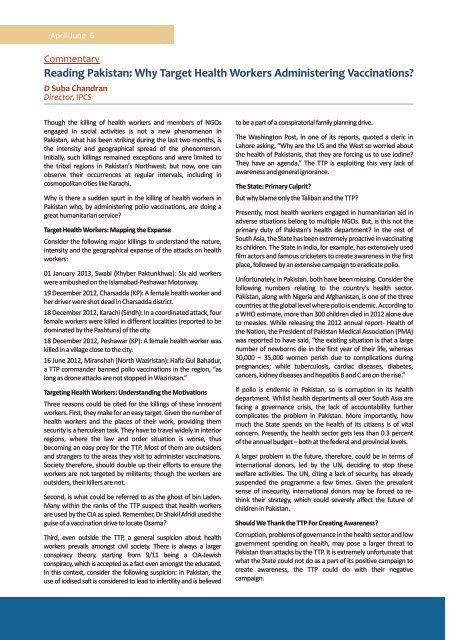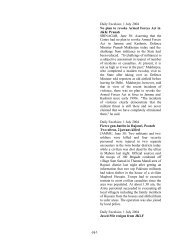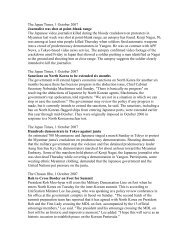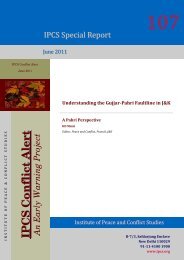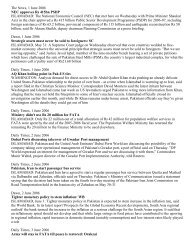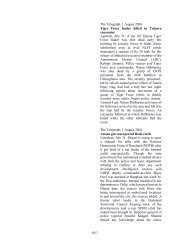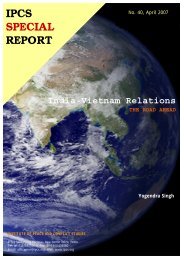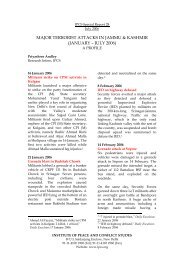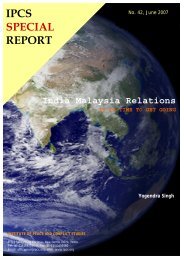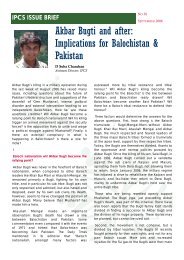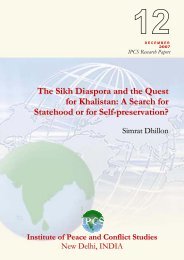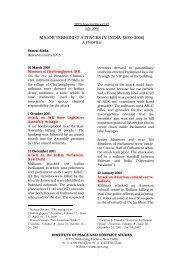April-June 2013 - Institute of Peace and Conflict Studies
April-June 2013 - Institute of Peace and Conflict Studies
April-June 2013 - Institute of Peace and Conflict Studies
Create successful ePaper yourself
Turn your PDF publications into a flip-book with our unique Google optimized e-Paper software.
<strong>April</strong>-<strong>June</strong> 6<br />
Commentary<br />
Reading Pakistan: Why Target Health Workers Administering Vaccinations?<br />
D Suba Ch<strong>and</strong>ran<br />
Director, IPCS<br />
Though the killing <strong>of</strong> health workers <strong>and</strong> members <strong>of</strong> NGOs<br />
engaged in social activities is not a new phenomenon in<br />
Pakistan, what has been striking during the last two months, is<br />
the intensity <strong>and</strong> geographical spread <strong>of</strong> the phenomenon.<br />
Initially, such killings remained exceptions <strong>and</strong> were limited to<br />
the tribal regions in Pakistan's Northwest; but now, one can<br />
observe their occurrences at regular intervals, including in<br />
cosmopolitan cities like Karachi.<br />
Why is there a sudden spurt in the killing <strong>of</strong> health workers in<br />
Pakistan who, by administering polio vaccinations, are doing a<br />
great humanitarian service?<br />
Target Health Workers: Mapping the Expanse<br />
Consider the following major killings to underst<strong>and</strong> the nature,<br />
intensity <strong>and</strong> the geographical expanse <strong>of</strong> the attacks on health<br />
workers:<br />
01 January <strong>2013</strong>, Swabi (Khyber Paktunkhwa): Six aid workers<br />
were ambushed on the Islamabad-Peshawar Motorway.<br />
19 December 2012, Charsadda (KP): A female health worker <strong>and</strong><br />
her driver were shot dead in Charsadda district.<br />
18 December 2012, Karachi (Sindh): In a coordinated attack, four<br />
female workers were killed in different localities (reported to be<br />
dominated by the Pashtuns) <strong>of</strong> the city.<br />
18 December 2012, Peshawar (KP): A female health worker was<br />
killed in a village close to the city.<br />
16 <strong>June</strong> 2012, Miranshah (North Waziristan): Hafiz Gul Bahadur,<br />
a TTP comm<strong>and</strong>er banned polio vaccinations in the region, “as<br />
long as drone attacks are not stopped in Waziristan.”<br />
Targeting Health Workers: Underst<strong>and</strong>ing the Motivations<br />
Three reasons could be cited for the killings <strong>of</strong> these innocent<br />
workers. First, they make for an easy target. Given the number <strong>of</strong><br />
health workers <strong>and</strong> the places <strong>of</strong> their work, providing them<br />
security is a herculean task. They have to travel widely in interior<br />
regions, where the law <strong>and</strong> order situation is worse, thus<br />
becoming an easy prey for the TTP. Most <strong>of</strong> them are outsiders<br />
<strong>and</strong> strangers to the areas they visit to administer vaccinations.<br />
Society therefore, should double up their efforts to ensure the<br />
workers are not targeted by militants; though the workers are<br />
outsiders, their killers are not.<br />
Second, is what could be referred to as the ghost <strong>of</strong> bin Laden.<br />
Many within the ranks <strong>of</strong> the TTP suspect that health workers<br />
are used by the CIA as spied. Remember, Dr Shakil Afridi used the<br />
guise <strong>of</strong> a vaccination drive to locate Osama?<br />
Third, even outside the TTP, a general suspicion about health<br />
workers prevails amongst civil society. There is always a larger<br />
conspiracy theory, starting from 9/11 being a CIA-Jewish<br />
conspiracy, which is accepted as a fact even amongst the educated.<br />
In this context, consider the following suspicion: in Pakistan, the<br />
use <strong>of</strong> iodised salt is considered to lead to infertility <strong>and</strong> is believed<br />
to be a part <strong>of</strong> a conspiratorial family planning drive.<br />
The Washington Post, in one <strong>of</strong> its reports, quoted a cleric in<br />
Lahore asking, “Why are the US <strong>and</strong> the West so worried about<br />
the health <strong>of</strong> Pakistanis, that they are forcing us to use iodine?<br />
They have an agenda.” The TTP is exploiting this very lack <strong>of</strong><br />
awareness <strong>and</strong> general ignorance.<br />
The State: Primary Culprit?<br />
But why blame only the Taliban <strong>and</strong> the TTP?<br />
Presently, most health workers engaged in humanitarian aid in<br />
adverse situations belong to multiple NGOs. But, is this not the<br />
primary duty <strong>of</strong> Pakistan's health department? In the rest <strong>of</strong><br />
South Asia, the State has been extremely proactive in vaccinating<br />
its children. The State in India, for example, has extensively used<br />
film actors <strong>and</strong> famous cricketers to create awareness in the first<br />
place, followed by an extensive campaign to eradicate polio.<br />
Unfortunately, in Pakistan, both have been missing. Consider the<br />
following numbers relating to the country's health sector.<br />
Pakistan, along with Nigeria <strong>and</strong> Afghanistan, is one <strong>of</strong> the three<br />
countries at the global level where polio is endemic. According to<br />
a WHO estimate, more than 300 children died in 2012 alone due<br />
to measles. While releasing the 2012 annual report- Health <strong>of</strong><br />
the Nation, the President <strong>of</strong> Pakistan Medical Association (PMA)<br />
was reported to have said, “the existing situation is that a large<br />
number <strong>of</strong> newborns die in the first year <strong>of</strong> their life, whereas<br />
30,000 – 35,000 women perish due to complications during<br />
pregnancies; while tuberculosis, cardiac diseases, diabetes,<br />
cancers, kidney diseases <strong>and</strong> hepatitis B <strong>and</strong> C are on the rise.”<br />
If polio is endemic in Pakistan, so is corruption in its health<br />
department. Whilst health departments all over South Asia are<br />
facing a governance crisis, the lack <strong>of</strong> accountability further<br />
complicates the problem in Pakistan. More importantly, how<br />
much the State spends on the health <strong>of</strong> its citizens is <strong>of</strong> vital<br />
concern. Presently, the health sector gets less than 0.3 percent<br />
<strong>of</strong> the annual budget – both at the federal <strong>and</strong> provincial levels.<br />
A larger problem in the future, therefore, could be in terms <strong>of</strong><br />
international donors, led by the UN, deciding to stop these<br />
welfare activities. The UN, citing a lack <strong>of</strong> security, has already<br />
suspended the programme a few times. Given the prevalent<br />
sense <strong>of</strong> insecurity, international donors may be forced to rethink<br />
their strategy, which could severely affect the future <strong>of</strong><br />
children in Pakistan.<br />
Should We Thank the TTP For Creating Awareness?<br />
Corruption, problems <strong>of</strong> governance in the health sector <strong>and</strong> low<br />
government spending on health, may pose a larger threat to<br />
Pakistan than attacks by the TTP. It is extremely unfortunate that<br />
what the State could not do as a part <strong>of</strong> its positive campaign to<br />
create awareness, the TTP could do with their negative<br />
campaign.


